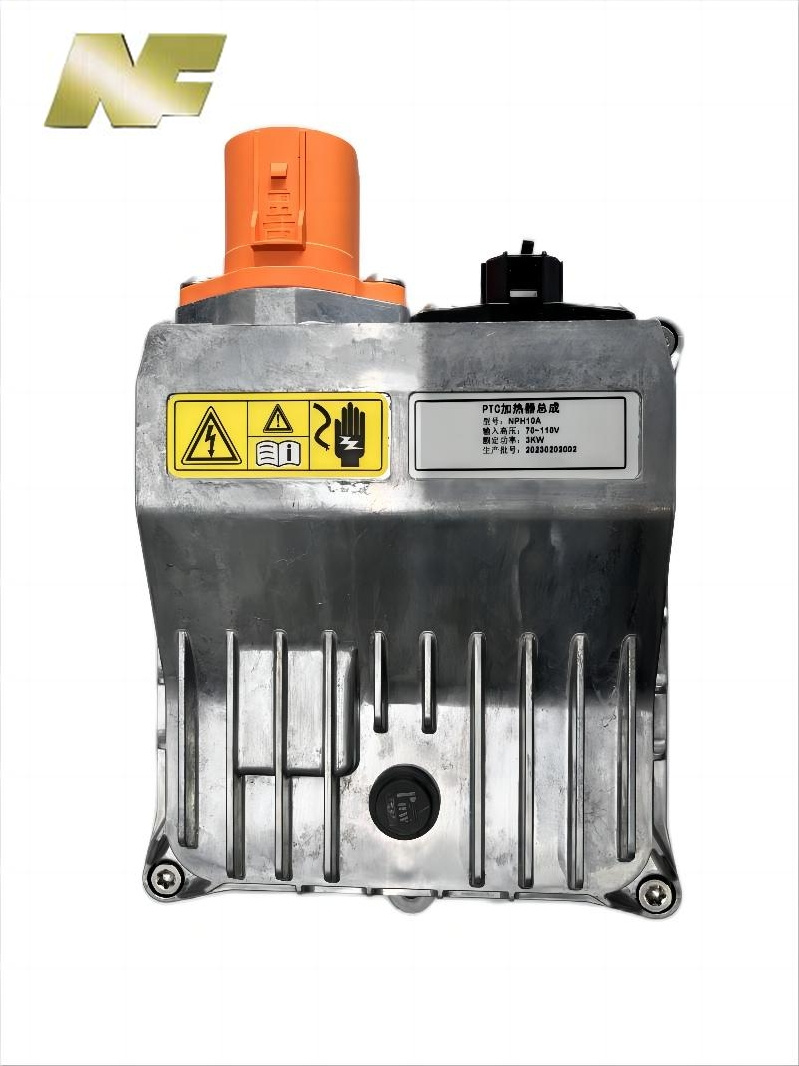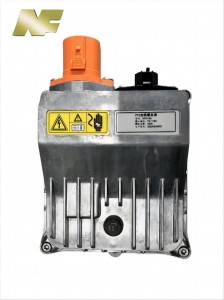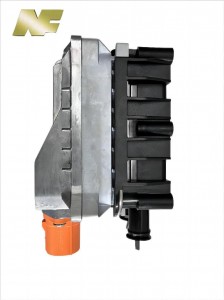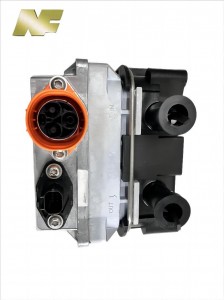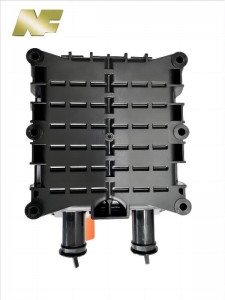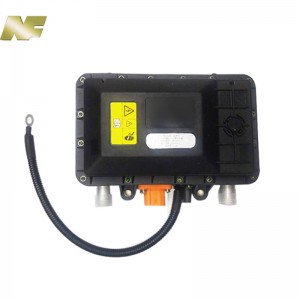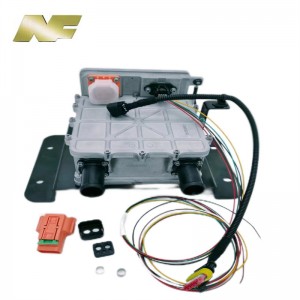NF 3KW 12V PTC Coolant Heater 100V High Voltage Coolant Heater
Description
As automotive technology advances and environmental regulations tighten, automakers are constantly seeking innovative solutions to improve vehicle performance and reduce emissions. A key component that plays an important role in achieving these goals is the coolant system and its corresponding heater. In this blog post, we will explore the revolutionary High Voltage PTC Heaters (HVCH) and analyze how they are changing the automotive industry by providing efficient and environmentally friendly coolant heating solutions.
High Voltage PTC Heaters: The Evolution of Coolant Heating
PTC (Positive Temperature Coefficient) heaters have been around for some time, providing reliable heating solutions for a variety of applications. However, the introduction of HVCH has taken this technology to a whole new level. HVCH combines the power of a PTC heating element with high voltage protection, making it a game changer in the automotive sector.
Efficiency and precision in coolant heating
Modern vehicles rely heavily on advanced electronics and precise control systems, and traditional heating methods often fall short due to lack of accuracy and efficiency. On the other hand, HVCH heaters excel in these areas. The HVCH unit is equipped with a high voltage sensor and an electronic controller that accurately measures temperature and adjusts heating output accordingly. This level of precision not only ensures optimal coolant heating, but also prevents overheating, reduces energy consumption and increases vehicle efficiency.
fast and safe heating
The use of high voltage PTC ceramics in HVCH units enables rapid heating, reduces start-up time and eliminates cold start problems. Conventional heating systems often require a significant amount of time to warm up to provide the desired temperature, causing discomfort to the driver and passengers. The HVCH heater eliminates this delay, ensuring the cabin reaches a comfortable temperature quickly and efficiently without relying on the vehicle's internal combustion engine or wasting valuable fuel.
Additionally, HVCH units are designed with built-in safety features that provide reliable protection against potential hazards. The positive temperature coefficient characteristic of PTC ceramics ensures that the heater automatically self-regulates its heating output, preventing overheating and minimizing the risk of fire or coolant system damage. This safety mechanism gives the driver peace of mind when operating the vehicle.
Environmental Solutions
As the world focuses on reducing carbon emissions and adopting sustainable practices, HVCH heaters emerge as a more environmentally friendly alternative to conventional heating systems. By providing efficient and accurate heating independent of the vehicle's engine, HVCH units can significantly reduce fuel consumption and exhaust emissions, ultimately contributing to a cleaner, more sustainable environment.
Additionally, the use of PTC ceramics in HVCH heaters eliminates the need for hazardous refrigerants commonly found in older coolant systems, such as chlorofluorocarbons (CFCs) or hydrofluorocarbons (HFCs). This environmentally friendly aspect not only complies with environmental regulations, but also makes HVCH heaters a responsible choice for automakers and consumers.
Versatility and Longer Life
HVCH heaters are designed to be compatible with various vehicle types and coolant systems, making them a versatile solution for automakers. They can be seamlessly integrated into electric vehicles (EV), hybrid vehicles and conventional internal combustion engine vehicles, ensuring consistent and reliable heating performance across different platforms.
In addition, HVCH heaters have a longer service life compared to traditional heaters. The robust design, high-quality materials and efficient energy management of HVCH units help extend their service life, reducing maintenance costs for vehicle owners and manufacturers.
in conclusion
In conclusion, HVCH heaters represent a major leap forward in coolant heating technology. Their ability to provide efficient, precise and safe heating, combined with their environmentally friendly properties, make them an important part of automakers' efforts to improve vehicle performance and reduce environmental impact. With the growing demand for greener and more efficient automotive solutions, HVCH heaters will play a key role in shaping the future of the automotive industry.
Technical Parameter
| Low voltage range | 9-36V |
| High voltage range | 112-164V |
| Rated power | rated voltage 80V, flow rate 10L/min, coolant outlet temperature 0 ℃, power 3000W ± 10% |
| Rated voltage | 12v |
| Operating temperature | -40℃~+85℃ |
| Storage temperature | -40℃~+105℃ |
| Coolant temperature | -40℃~+90℃ |
| Protection grade | IP67 |
| Product weight | 2.1KG±5% |
Advantage
Constant temperature heating, safe to use
Strong impact resistance and long service life
Non-polarity, both AC and DC are available
The maximum working current can reach dozens of amperes
Small size
High thermal efficiency
Application


Our Company
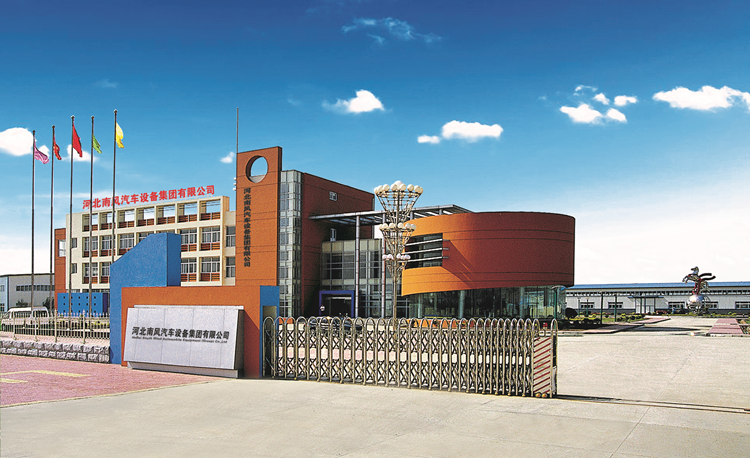

Hebei Nanfeng Automobile Equipment (Group) Co., Ltd is a group company with 5 factories, that specially produce parking heaters, heater parts, air conditioner and electric vehicle parts for more than 30 years. We are the leading auto parts manufacturers in China.
Our factory's production units are equipped with high tech machineries, strict quality,control testing devices and a team of professional technicians and engineers endorsing the quality and authenticity of our products.
In 2006, our company has passed ISO/TS16949:2002 quality management system certification. We also bagged the CE certificate and Emark certificate making us among the only few companies in the world acquiring such high level certifications. Currently being the largest stakeholders in China, we hold a domestic market share of 40% and then we export them around the globe particularly in Asia, Europe and Americas.
Meeting the standards and demands of our customers have always been our top priority. It always encourages our experts to continuously brain storm, innovate, design and manufacture new products, impeccably suitable for the Chinese market and our customers from every nook of the world.
FAQ
1. What is a PTC coolant heater?
PTC coolant heater is a heating device for vehicles to heat the engine coolant to ensure the optimum starting temperature of the engine. It utilizes positive temperature coefficient (PTC) heating elements to provide efficient, reliable heating.
2. How does the PTC coolant heater work?
PTC coolant heaters work by passing electrical current through a ceramic element with a positive temperature coefficient. The component heats up rapidly as resistance increases with temperature. The heat generated is transferred to the engine coolant, warming it up and ensuring a quick and efficient start.
3. What are the benefits of using a PTC coolant heater?
There are several advantages to using a PTC coolant heater, including:
- Rapid engine warm-up: By preheating the coolant, the engine reaches its optimum operating temperature faster, improving overall performance and reducing wear.
- Fuel Efficiency: Hot engines require less fuel to start, resulting in improved fuel efficiency and reduced emissions.
- Reduced engine wear: Cold starts can stress the engine causing increased wear. The PTC coolant heater minimizes engine wear by providing a hot start and reducing friction.
- Enhanced Passenger Comfort: The heater warms the passenger compartment more quickly in cold weather for a more comfortable driving experience.
4. Can a PTC coolant heater be retrofitted to an existing vehicle?
Yes, PTC coolant heaters can be retrofitted on existing vehicles in most cases. However, it is recommended to consult a professional mechanic or installer to ensure compatibility and proper installation.
5. Is the PTC coolant heater suitable for all types of vehicles?
PTC coolant heaters are suitable for a wide variety of vehicles including cars, trucks, motorcycles, boats and other motorized equipment. They can be adjusted to suit various engine sizes and coolant systems.
6. How long does it take for the PTC coolant heater to warm up the engine?
The warm-up time for the PTC coolant heater varies depending on factors such as ambient temperature and engine size. Typically, a PTC coolant heater can warm up an engine within 30 minutes to a few hours, ensuring it reaches its optimum operating temperature.
7. Can the PTC coolant heater be used in extreme weather conditions?
Yes, PTC coolant heaters are designed to withstand extreme weather conditions, including extremely low temperatures. They are robust and reliable, ensuring efficient engine warm-up even in harsh climates.
8. Is it safe to run the PTC coolant heater unattended?
PTC coolant heaters are designed with safety features to prevent overheating and damage. However, it is generally not recommended to leave heaters running unattended for extended periods of time. It is best to follow the manufacturer's instructions and guidelines for safe handling.
9. Can a PTC coolant heater be used as the only heating system in a vehicle?
Although the PTC coolant heater provides heating for the engine and passenger compartment, it is not intended to replace the vehicle's main heating system. It is designed to help the engine warm up quickly and improve passenger comfort in cold weather conditions.
10. Are PTC coolant heaters energy efficient?
Yes, PTC coolant heaters are known for their energy efficiency. Positive temperature coefficient technology ensures that energy is only consumed in the heating process, reducing energy waste. This efficiency helps save fuel and reduce emissions.

